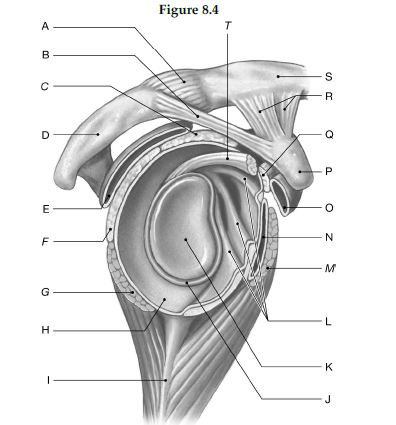Using the figure below, identify the labeled part.

1) Label A: ______________________________
2) Label B: ______________________________
3) Label C: ______________________________
4) Label D: ______________________________
5) Label E: ______________________________
6) Label F: ______________________________
7) Label G: ______________________________
8) Label H: ______________________________
9) Label I: ______________________________
10) Label J: ______________________________
11) Label K: ______________________________
12) Label L: ______________________________
13) Label M: ______________________________
14) Label N: ______________________________
15) Label O: ______________________________
16) Label P: ______________________________
17) Label Q: ______________________________
18) Label R: ______________________________
19) Label S: ______________________________
20) Label T: ______________________________
1) Acromioclavicular ligament
2) Coracoacromial ligament
3) Tendon of supraspinatus muscle
4) Acromion
5) Subacromial bursa
6) Tendon of infraspinatus muscle
7) Teres minor muscle
8) Articular capsule
9) Scapula
10) Glenoid labrum
11) Glenoid cavity
12) Glenohumeral ligaments
13) Subscapularis muscle
14) Subscapular bursa
15) Subcoracoid bursa
16) Coracoid process
17) Coracohumeral ligament (cut
18) Coracoclavicular ligaments
19) Clavicle
20) Tendon of biceps brachii muscle
You might also like to view...
The developing heart and lungs begin to receive autonomic innervation in the ________ week of development.
A. 10th B. 5th C. 4th D. 6th E. 16th
True or False? The body synthesizes nonessential amino acids in a process called oxidative deamination.
Answer the following statement true (T) or false (F)
What types of stimuli are detected by the skin's sensory receptors?
What will be an ideal response?
How many pairs of cranial nerves are in the human body?
a. 10. b. 11. c. 12. d. 13.